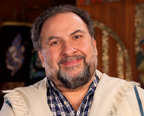What is Jewish Renewal?

Jewish Renewal seeks to unblock and continue the Jewish Path (Halakha). As our teacher, Reb Zalman Schachter-Shalomi, the “founder” of Jewish Renewal, teaches that there is no denominational ownership of this process of renewing the inner energy of Judaism. The question of “How to be Jewish?” has been replaced with “Why be Jewish?” and there is no denominational answer to that.
Those who believe that the only path is to “restore” Judaism to what it once was are driving the Jewish vehicle on the “Path” looking only through the rear-view mirrors. Those who wish to “renew” Judaism use the rear-view mirrors for safety but are always looking through the windshield toward the horizon.
Rabbi Marcia Prager, an important teacher of Jewish Renewal, writes:
Jewish Renewal is dedicated to revealing Judaism’s inner spirit and nurturing the spiritual life of Jews. Jewish Renewal draws significant spiritual inspiration from the legacy of Jewish mystical and Hassidic traditions, which is expressed in the cultivation of traditional practices such as meditation, chanting, davening and the study of traditional Kabbalistic and Hassidic sources to enhance both individual and communal practice. Jewish Renewal seeks to transform and renew the kavanah (spiritual intention) with which Jews of all kinds practice Judaism.
Jewish Renewal is neither “halakhic” nor “anti-halakhic” but “neo-halakhic.” Just as Rabbinic Judaism involved transcending the halakhah of Temple sacrifice, so Jewish Renewal seeks to go beyond the limitations of traditional Rabbinic Judaism to forge a new halakhah in which Judaism is conscious of its place in an interconnected world. This new halakhah, for instance, includes expansion of the practice of kashrut to include ecological and ethical criteria, a new exploration of the concept of work as it applies to both the personal and societal Shabbat, and re-examination of intimacy and intimate relationships.
This approach embraces a reclaiming of the primal power of Jewish ritual rather than discarding it. Renewal makes observance important. To become an observant Jew is to be “happy sitting in Your house,” ashrei yoshvei vetekha, the Divine house that is the universe and the reality where we find ourselves. This awareness is enriched by “sitting,” yeshiva, and listening, Shema Yisrael. Sitting and observing and contemplating the very nature of our perceptions and identities helps create a Jewish practice whose imperatives come from a deep place within us. These mitzvot, whether it is Shabbat observance, kashrut and so many others, serve to create points of connection to the past and the future, but more importantly to each other as Jewish human beings.
Jewish Renewal benefits from historical Judaism and its practices, as well as from teachings of other ancient wisdom traditions. Renewal’s holistic approach strives to make yiddishkayt (Jewishness) a path to menschlichkayt (humanness). Renewal’s goal is to bring awareness and enlightenment (me-afelah l’orah—from darkness to light) to those dark places that we all possess in our life struggles. Renewal makes it possible to find out that there is deep beauty in our tradition.
This transformation in our reality calls for action in the Four Worlds of reality: Atzilut (Spirit); Briyah (Creative Intellect); Yetzirah (The Heart); Asiyah (Action, Physicality).

Rabbi Moshe Waldoks serves Temple Beth Zion (TBZ), an independent synagogue in Brookline.
Learn more about Jewish Renewal here, and about Reb Zalman Shachter-Shalomi here.
This post has been contributed by a third party. The opinions, facts and any media content are presented solely by the author, and JewishBoston assumes no responsibility for them. Want to add your voice to the conversation? Publish your own post here. MORE
